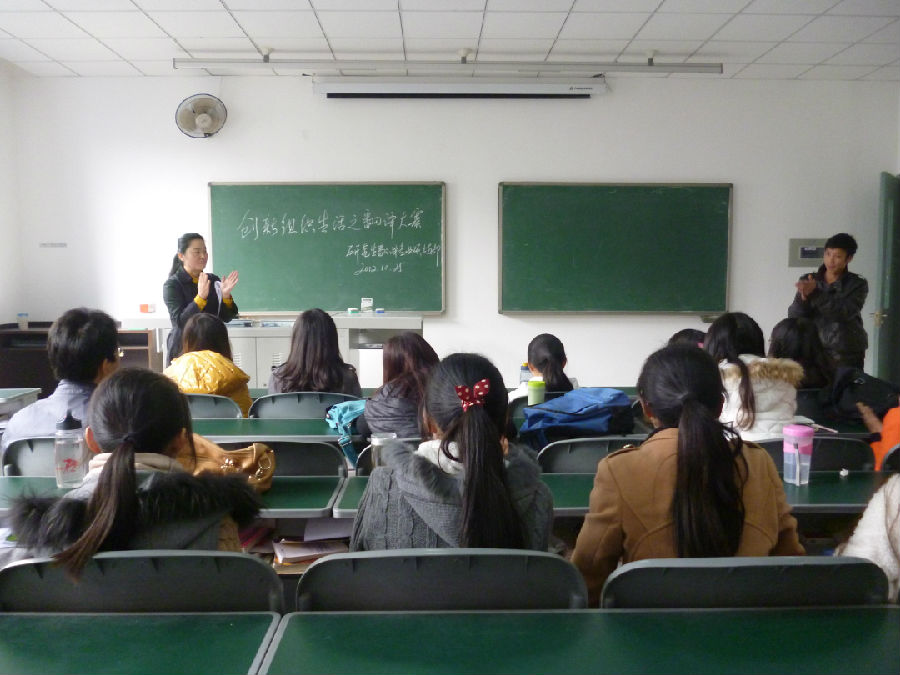 返回
教育头条
返回
教育头条

考研英语长难句解析和译文分享
考研倒计时6天考研英语一的句子翻译大部分都是长难句,因此每个句子我会先把结构梳理清楚,然后把翻译中的难点给大家列出来。 大家仔细思考这些难点要怎么处理,然后试着先把句子翻译出来,后面再看后面的解析和译文。
第四段A native literary drama had been created, its alliance with the public playhouses established, and at least some of its great traditions had been begun.句子结构: 本句有一个比较难的语法点: 独立主格。 简单来说,独立主格是一种具有逻辑主谓关系的特殊结构,通常在句子里做状语。
翻译要点:
1. had been created/ had been begun 被动的翻译
2. its alliance with the public playhouses established 独立主格的理解和翻译
3.代词的翻译要点解析:
1.英语中的被动使用很多,但中文的被字句更多是使用在不好的事情上,如“被捕”,“被杀”,“被剥削”等,虽然现代汉语被字句使用范围有所扩大,但使用概率仍远小于英文。 在翻译英语被动句的时候我们一般有几种处理方法: ①被动变主动; ②用 “为...所; 让”等表示; ③直接省去“被”字。 本句中的两个被动都采取第三种译法。
2.独立主格的形式是名词 分词/不定式/形容词/副词/介词短语,名词与后面的部分有逻辑上的关系,但是不能有谓语动词,否则就是句子主干冲突了。如 its alliance with the public playhouses established ,就是名词 alliance established ,他们之间是有逻辑关系的,但又不能加上动词 had been 。独立主格经常翻译成句子。
3.代词是英汉两种语言之间的另一个显著差异。 英语中,事物第 一次出现需要使用名词,后面的句子如果再次出现需要使用代词。 中文也有代词,但使用概率不如英文,或者重复前面的名词,或者省略。本句中两个 its 都是指代 literary drama's ,第 一次出现翻译成代词还可以,但如果第二次出现的地方仍然用代词就读起来不顺了,因此在翻译 its great traditions 时,我们可以把代词所指代的名词再次重复一下"这种戏剧形式的一些传统"。
全文阅读
Shakespeare’s life time was coincident with a period of extraordinary activity and achievement in the drama. By the date of his birth Europe was witnessing the passing of the religious drama, and the creation of new forms under the incentive of classical tragedy and comedy. These new forms were at first mainly written by scholars and performed by amateurs,but in England, as everywhere else in western Europe, the growth of a class of professional actors was threatening to make the drama popular, whether it should be new or old,classical or medieval,literary or farcical. Court, school organizations of amateurs,and the traveling actors were all rivals in supplying a widespread desire for dramatic entertainment;and no boy who went a grammar school could be ignorant that the drama was a form of literature which gave glory to Greece and Rome and might yet bring honor to England.

When Shakespeare was twelve years old, the first public playhouse was built in London. For a time literature showed no interest in this public stage. Plays aiming at literary distinction were written for school or court, or for the choir boys of St. Paul’s and the royal chapel,who,however, gave plays in public as well as at court. But the professional companies prospered in their permanent theaters, and university men with literature ambitions were quick to turn to these theaters as offering a means of livelihood. By the time Shakespeare was twentyfive,Lyly,Peele,and Greene had made comedies that were at once popular and literary;Kyd had written a tragedy that crowded the pit; and Marlowe had brought poetry and genius to triumph on the common stage where they had played no part since the death of Euripides. A native literary drama had been created, its alliance with the public playhouses established, and at least some of its great traditions had been begun.
The development of the Elizabethan drama for the next twentyfive years is of exceptional interest to students of literary history,for in this brief period we may trace the beginning,growth,blossoming,and decay of many kinds of plays,and of many great careers. We are amazed today at the mere number of plays produced,as well as by the number of dramatists writing at the same time for this London of two hundred thousand inhabitants. To realize how great was the dramatic activity, we must remember further that hosts of plays have been lost,and that probably there is no author of note whose entire work has survived.
第四段A native literary drama had been created, its alliance with the public playhouses established, and at least some of its great traditions had been begun.句子结构: 本句有一个比较难的语法点: 独立主格。 简单来说,独立主格是一种具有逻辑主谓关系的特殊结构,通常在句子里做状语。
翻译要点:
1. had been created/ had been begun 被动的翻译
2. its alliance with the public playhouses established 独立主格的理解和翻译
3.代词的翻译要点解析:
1.英语中的被动使用很多,但中文的被字句更多是使用在不好的事情上,如“被捕”,“被杀”,“被剥削”等,虽然现代汉语被字句使用范围有所扩大,但使用概率仍远小于英文。 在翻译英语被动句的时候我们一般有几种处理方法: ①被动变主动; ②用 “为...所; 让”等表示; ③直接省去“被”字。 本句中的两个被动都采取第三种译法。
2.独立主格的形式是名词 分词/不定式/形容词/副词/介词短语,名词与后面的部分有逻辑上的关系,但是不能有谓语动词,否则就是句子主干冲突了。如 its alliance with the public playhouses established ,就是名词 alliance established ,他们之间是有逻辑关系的,但又不能加上动词 had been 。独立主格经常翻译成句子。
3.代词是英汉两种语言之间的另一个显著差异。 英语中,事物第 一次出现需要使用名词,后面的句子如果再次出现需要使用代词。 中文也有代词,但使用概率不如英文,或者重复前面的名词,或者省略。本句中两个 its 都是指代 literary drama's ,第 一次出现翻译成代词还可以,但如果第二次出现的地方仍然用代词就读起来不顺了,因此在翻译 its great traditions 时,我们可以把代词所指代的名词再次重复一下"这种戏剧形式的一些传统"。
全文阅读
Shakespeare’s life time was coincident with a period of extraordinary activity and achievement in the drama. By the date of his birth Europe was witnessing the passing of the religious drama, and the creation of new forms under the incentive of classical tragedy and comedy. These new forms were at first mainly written by scholars and performed by amateurs,but in England, as everywhere else in western Europe, the growth of a class of professional actors was threatening to make the drama popular, whether it should be new or old,classical or medieval,literary or farcical. Court, school organizations of amateurs,and the traveling actors were all rivals in supplying a widespread desire for dramatic entertainment;and no boy who went a grammar school could be ignorant that the drama was a form of literature which gave glory to Greece and Rome and might yet bring honor to England.

When Shakespeare was twelve years old, the first public playhouse was built in London. For a time literature showed no interest in this public stage. Plays aiming at literary distinction were written for school or court, or for the choir boys of St. Paul’s and the royal chapel,who,however, gave plays in public as well as at court. But the professional companies prospered in their permanent theaters, and university men with literature ambitions were quick to turn to these theaters as offering a means of livelihood. By the time Shakespeare was twentyfive,Lyly,Peele,and Greene had made comedies that were at once popular and literary;Kyd had written a tragedy that crowded the pit; and Marlowe had brought poetry and genius to triumph on the common stage where they had played no part since the death of Euripides. A native literary drama had been created, its alliance with the public playhouses established, and at least some of its great traditions had been begun.
The development of the Elizabethan drama for the next twentyfive years is of exceptional interest to students of literary history,for in this brief period we may trace the beginning,growth,blossoming,and decay of many kinds of plays,and of many great careers. We are amazed today at the mere number of plays produced,as well as by the number of dramatists writing at the same time for this London of two hundred thousand inhabitants. To realize how great was the dramatic activity, we must remember further that hosts of plays have been lost,and that probably there is no author of note whose entire work has survived.
谢谢你,阅读了这篇文章。我是教育宝学习顾问王敏,如何选择考研是一个比较复杂的问题,考研市场鱼龙混杂,广告铺天盖地,每家机构都把自己包装的天花乱坠,如何选择一家合适的机构?这是很多人都头疼的问题,选错机构不是费钱,而是浪费时间。教育宝始终保持中立客观,累计服务200万用户,致力于连接培训机构和学员,打造可靠、高效、让人放心的一站式互联网学习服务平台,如果你不知道考研机构如何选,那么请让我来帮助你,加我微信:18560125702,我会根据你的实际需求,依靠8年从业经验,从海量课程中选择适合您的服务。返回教育宝头条
【免责声明】本文仅代表作者本人观点,与教育宝无关。教育宝对文中陈述、观点判断保持中立,不对所包含内容的准确性、可靠性或完整性提供任何保证。请读者仅作参考,特此声明!





